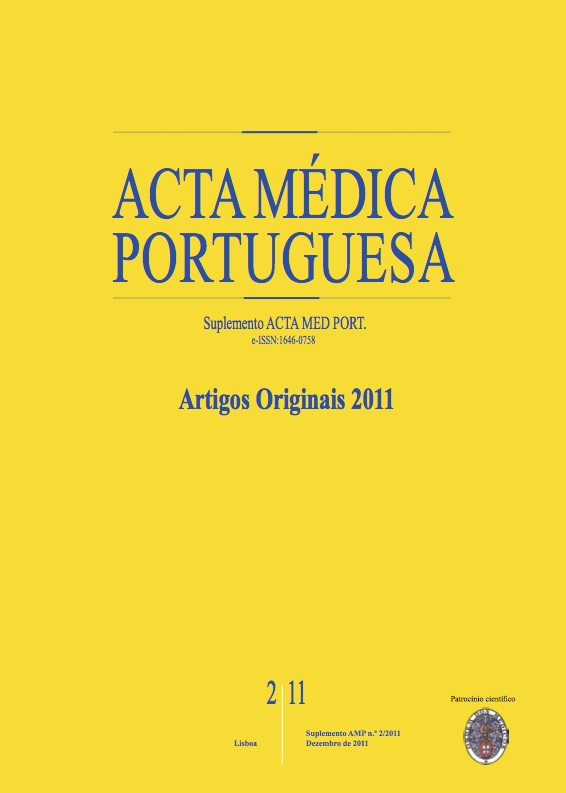A medicina geral e familiar e a abordagem do consumo de álcool: detecção e intervenções breves no âmbito dos cuidados de saúde primários.
DOI:
https://doi.org/10.20344/amp.1480Resumo
Evaluate if Brief Interventions are effective to reduce alcohol consumption of patients detected as risky consumers; Evaluate if the Physicians' training on Brief Interventions to approach alcohol consumption related problems (ARP) contributes to change their attitudes towards hazardous and harmful alcohol consumers.The study had two distinct phases. One phase of characterization and assessment of SAAPPQ in a random sample of physicians in the District of Lisbon (Phase 1), and another phase with two components: 1) examine the perceived attitudes of FPs/GPs towards alcohol consumption of their patients before training and again nine months after training, when they were already using early identification and brief intervention (EIBI) in their clinical practice; 2) determine whether the clinical competences of the FPs/GPs had improved in detecting and intervening next to their patients with hazardous or harmful alcohol consumption, after the training in Brief Interventions. This detection was measured by the AUDIT questionnaire, applied again to the patients nine months after the first time (Phase 2).Physicians in the experimental group at T2 felt more motivated, had higher self-esteem and were more satisfied than the control group. There was a positive development of the attitude of physicians from the first stage to the second stage, especially in the physicians of the experimental group. PATIENTS (T1)--In the sample of patients to whom AUDIT was applied, 60% were female and the mean age was 54 years. It was observed that 21% of the patients had some risky alcohol consumption (AUDIT C). Patients (T1 and T2)--In the sample of patients with risk consumption, 62% were male and the mean age was 55 years old. Patients followed by a physician of the experimental group (compared to patients followed by a physician of the control group) had an increase of 54% in the success rate in reduction of, at least, one point on the AUDIT, from the first to the second stage of the study. In the first stage of the study, the consumption of alcohol (in grams) was homogeneous between groups and an average of 193 grams of alcohol consumption per week was observed. In the second instance of the study, the average alcohol consumption was 145 grams of alcohol per week. This decrease in consumption was observed mainly on patients followed by physicians of the experimental group. Relationship between physicians and patients--Results concerning the relationship between physicians and patients demonstrates that a better attitude of physicians in relation to ARP can influence the decrease in alcohol consumption of those patients (from the first to the second stage of the study).Downloads
Downloads
Como Citar
Edição
Secção
Licença
Todos os artigos publicados na AMP são de acesso aberto e cumprem os requisitos das agências de financiamento ou instituições académicas. Relativamente à utilização por terceiros a AMP rege-se pelos termos da licença Creative Commons ‘Atribuição – Uso Não-Comercial – (CC-BY-NC)’.
É da responsabilidade do autor obter permissão para reproduzir figuras, tabelas, etc., de outras publicações. Após a aceitação de um artigo, os autores serão convidados a preencher uma “Declaração de Responsabilidade Autoral e Partilha de Direitos de Autor “(http://www.actamedicaportuguesa.com/info/AMP-NormasPublicacao.pdf) e a “Declaração de Potenciais Conflitos de Interesse” (http://www.icmje.org/conflicts-of-interest) do ICMJE. Será enviado um e-mail ao autor correspondente, confirmando a receção do manuscrito.
Após a publicação, os autores ficam autorizados a disponibilizar os seus artigos em repositórios das suas instituições de origem, desde que mencionem sempre onde foram publicados e de acordo com a licença Creative Commons









